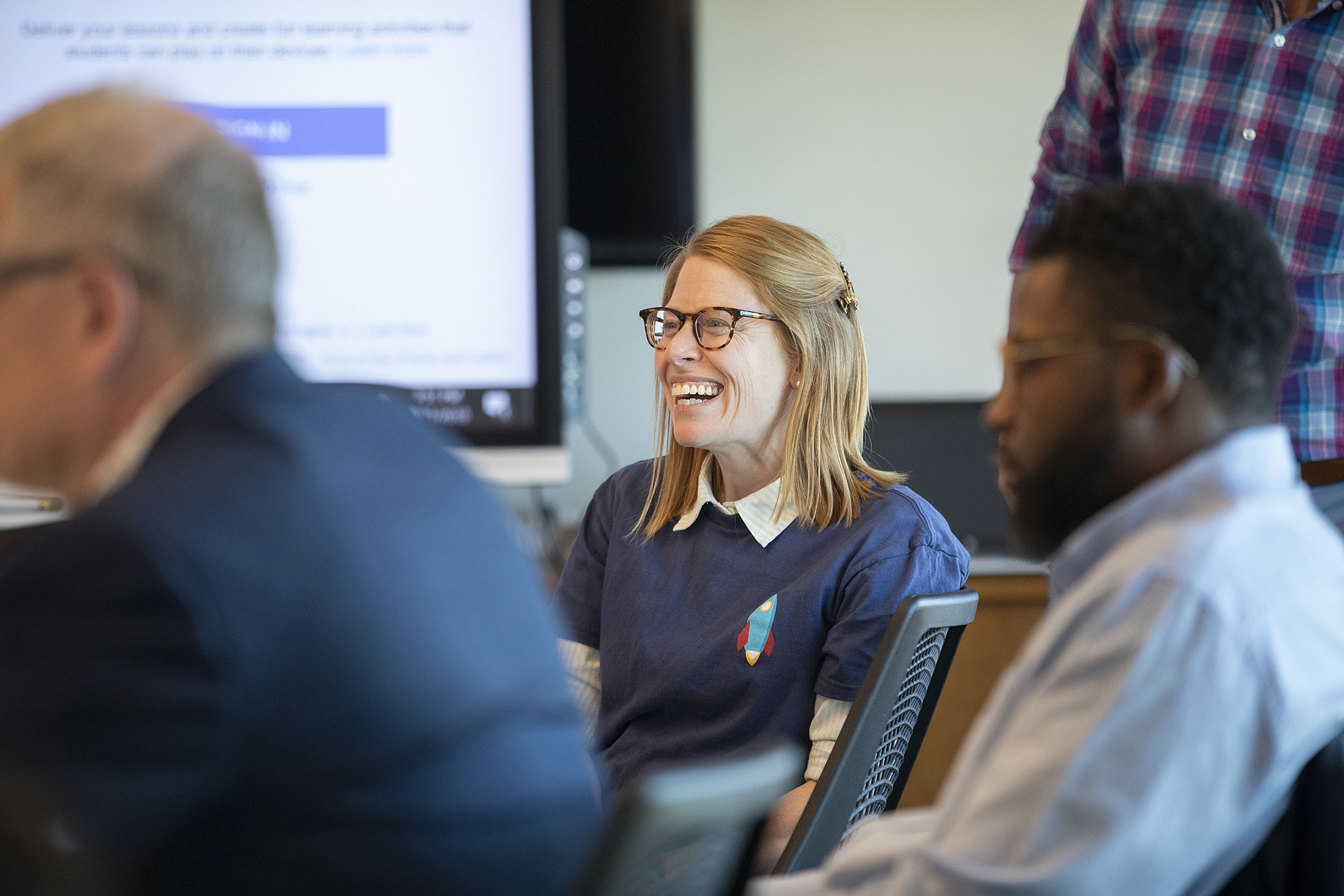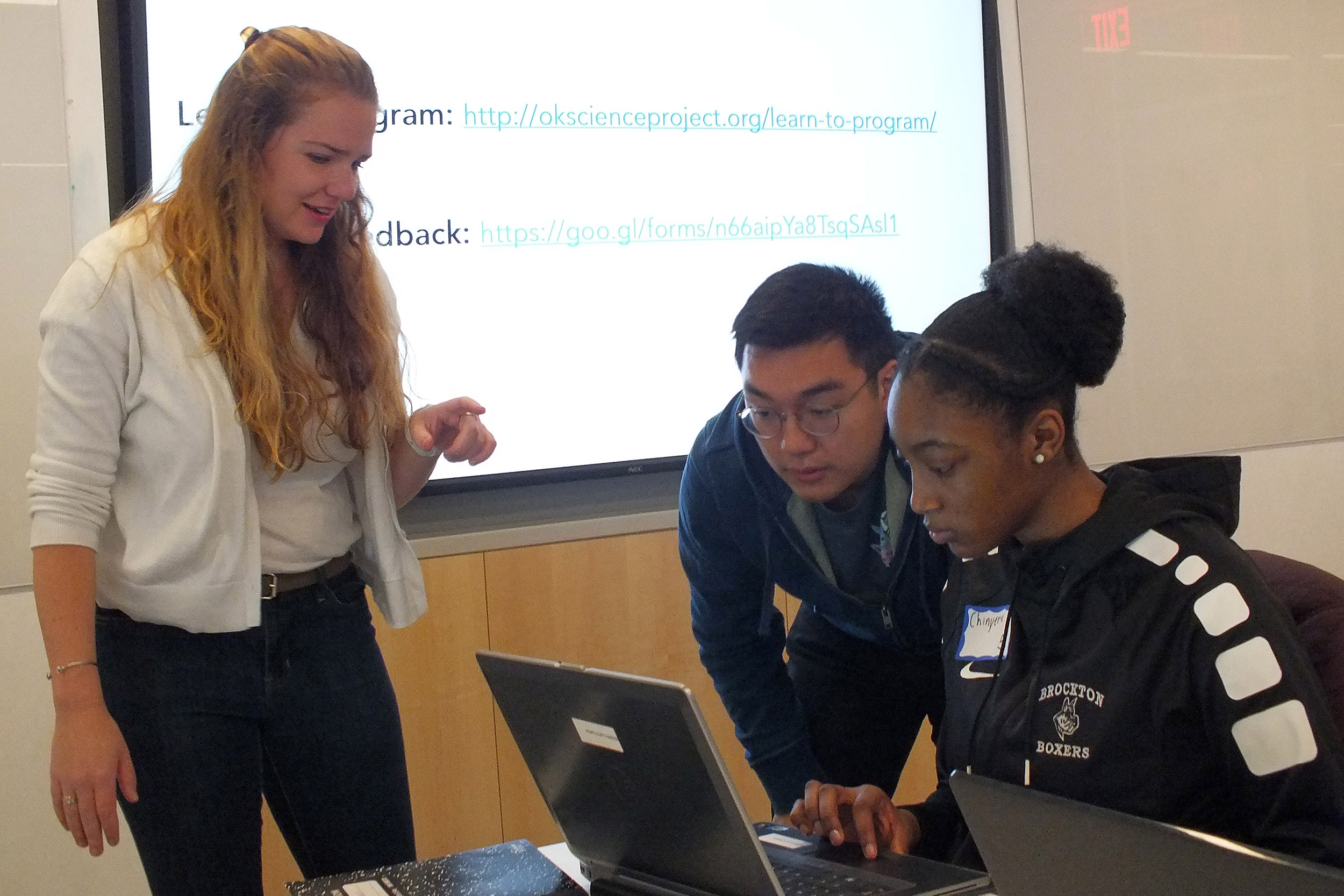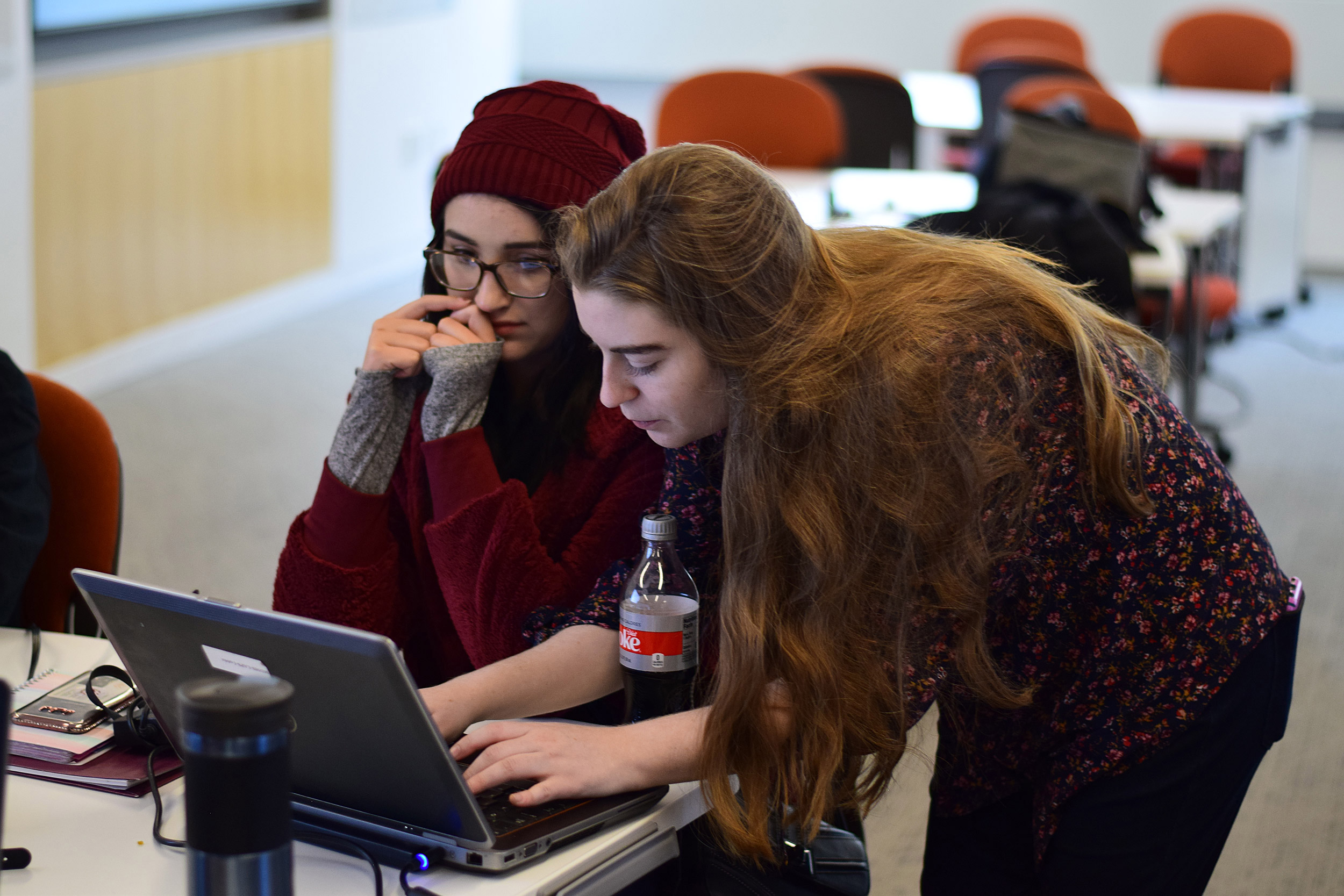
“You don’t solve a complicated problem like education with one field alone,” said Jaime B. Goldstein (center), HILT’s director of strategic projects and innovation grants. “You need a business mind. You need a technology mind. You need a marketing, sales mind. You need a pedagogy mind.”
Kris Snibbe/Harvard Staff Photographer
Innovation assignment
Program gives students firsthand experience in creating education start-ups
Tyler Hester cried into a stack of buttermilk pancakes at an IHOP in Pasadena, Calif.
It was two months into his teaching career, and he was already feeling overwhelmed and ineffective. “I’ll never forget this,” he said, recalling the breakfast with his mother. “The pancakes had just arrived and she asked me, ‘Tyler, how are you doing?’ My eyes welled up and a tear drop literally rolled onto the pancake in front of me and I just said, ‘Mom, it’s so hard.’”
A decade later, that low point led Hester, now in the final year of a doctor of education leadership program at the Harvard Graduate School of Education, to an idea: create an initiative to offer struggling new teachers emotional support. The need for such a program was apparent to Hester not just because of his own experience, but because of the nation’s high rates of teacher burnout and turnover.
But how to find the support and guidance to take his idea and turn it into an actual program? Hester turned to Operation Impact, a program launched last year by the Office of the Vice Provost for Advances in Learning and its Harvard Initiative for Learning and Teaching that supports budding entrepreneurs in education innovation.
Operation Impact has funded almost 200 students working on more than 80 projects around the country and the world. Ventures have included a school readiness app for incoming kindergartners, a medical case-logging system for surgeons, a workforce training program for youth in Indonesia, a support program for adolescents living with a caregiver or family member who struggles with mental health issues or addiction, and a mobile app that helps match students and mentors.
The program awards small seed grants for pilot projects, typically $200 to $500 up to four times a year, and provides access to software from its corporate sponsors that can help the groups get their projects off the ground. Limiting the size of the awards allows Operation Impact to spread the grants around more widely.
“We didn’t want to just award a bunch of people,” said Jaime B. Goldstein, HILT’s director of strategic projects and innovation grants. “We wanted to teach as many people as possible the mechanisms for how you go about being a change agent [in the field of education].”
The program encourages students to collaborate across disciplines and requires teams to meet with Harvard graduate students, called program fellows, who have experience in education innovation.
Funded by SMART Technologies — one of Operation Impact’s corporate sponsors —the fellows understand what funders are looking for, and they help teams research the problems they are addressing, build businesses plans, grow their teams, and tap into relevant research at Harvard. They also connect teams with external experts and potential funders. Their ultimate goal is to help the groups move their projects forward, said Gorick Ng, M.B.A. ’18, a fellow from last year.
“Standing between someone who has the passion, the background, and the skills and this better world they aspire to is this big mountain, this paralyzing question of what to do next. The problem is a lack of guidance, a lack of resources, a lack of community,” Ng said. “What this program offers is a structured way to help people take what is otherwise an overwhelming sense of ambiguity and nudge them into motion and help them take that next best step.”


Kate LaChance leads a bioinformatics workshop with HPREP students, while Rebecca Fine works with a student to help her solve bioinformatics problems on the Oklahoma Science Project, an online resource improving accessibility and promoting STEM education in Oklahoma. Along with pilot funding, Operation Impact helped them set up meetings with venture capitalists, entrepreneur networks, and other STEM focused education platforms.
Photos by S. Dean Lee and Marito Hayashi
For New Teachers Thriving, the program Hester started, Operation Impact and its fellows helped the team organize their resource allocation, develop their growth strategy, and prepare for meetings with funders and pitch competitions. In fact, Hester said participation in HILT helped the team — which includes Crystel Harris, Ed.L.D. ’21, and Akash Wasil ’19 — become finalists in two other Harvard funding competitions that support student entrepreneurs: the President’s Innovation Challenge and the Harvard Business School New Venture Competition. But what helped most of all was the confidence Operation Impact instilled in the group, Hester said.
“It was a big wind in our sails to have someone say, ‘This idea is not crazy. We think there’s something here and we think you should pursue it,’” Hester said. “It was just really encouraging to get their support.”
With funding this past year, the team was able to purchase food and supplies for the personal-development training they delivered to more than 50 Boston Public School teachers. This year, because of their early success, they’re reaching even more educators. Teachers in Boston are currently applying for the second version of the program and nearly 200 district teachers and administrators in Stockton, Calif., are taking part. In the future, New Teachers Thriving hopes to offer their training online so they can reach thousands of teachers across the country.
While Hester’s group did well, others got even more traction. Brown Art Ink has been lifting up artists of color for the past five years in cities such as Baltimore, Cleveland, Washington, D.C., Toronto, and Mexico City by offering training and creating paid opportunities for them to show their work in museums, galleries, and other public spaces. Co-founders Amanda Figueroa, who’s earning her Ph.D. in American studies from the Harvard Graduate School of Arts and Sciences, and Ravon Ruffin turned their $200 grant from Operation Impact into $8,000 in annual revenue.
This year, Operation Impact will invite students from the Massachusetts Institute of Technology to collaborate, making it open not only to all Harvard students in degree-granting programs but to all MIT students, too.
The move is in line with the program’s stance on collaboration. Teams must include more than one person and preferably feature members who represent different disciplines across both campuses.
“You don’t solve a complicated problem like education with one field alone,” Goldstein said. “You need a business mind. You need a technology mind. You need a marketing, sales mind. You need a pedagogy mind. You need all these different skill sets.”
Teams last year featured a mix of students from Harvard College, Harvard Business School, Harvard Divinity School, Harvard Extension School, GSAS, Harvard Graduate School of Design, HGSE, Harvard Kennedy School, Harvard Law School, and Harvard School of Public Health. There were also many non-Harvard affiliated members.
Operation Impact was designed in collaboration with HGSE, the Social Innovation and Change Initiative at HKS, the iLabs, and the HBS Social Enterprise Initiative. It works with SMART Technologies, Wix.com, Amazon Web Services (AWS) Educate, AWS EdStart, and RallyCry Ventures, which provide funding and access to software and experts.
One of the driving factors for its creation was the need for increased funding in education innovation. According to research from HILT, 97 percent of students looking for funding in education innovation at Harvard weren’t getting it.
“To me that was just not the message that I think we wanted to be giving students across Harvard,” Goldstein said. “In my mind, we need more students and not less students working in this problem space. We should be giving as many of them as possible the experiences to learn what it actually takes to take an idea and do something in the real world with it.”
Operation Impact’s University-wide kickoff event for students seeking funding this year is Oct. 3 at the Smith Campus Center from 5 to 8 p.m. Interested students can RSVP here.




